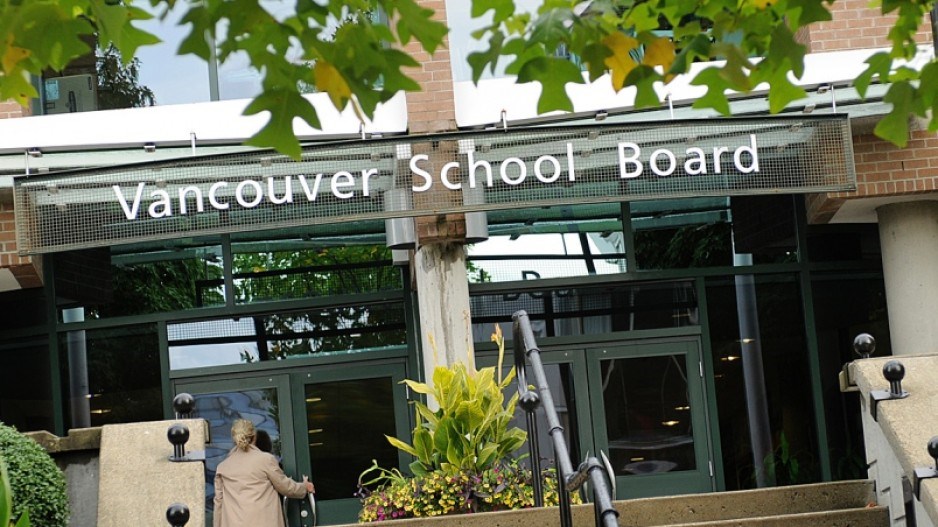The decision by Vancouver schools to cut honours programs will not only not resolve issues of inequity for students, but severely damage the city’s ability to maximize its human resources for a stronger economic future, a top local academic said.
The announcement – that the Vancouver School Board will cease operation of its two remaining honours math and science programs at local secondary schools – is a dangerous precedent to set for a city gearing itself to become a future driver of the tech, green and sustainable economies, said Andy Yan, director of The City Program at Simon Fraser University.
Yan said the move essentially represents a change in attitude in local public education from “pay it forward” to “take it back,” cutting costs of the honours program and leaving a large swath of the Vancouver student population without access to an accelerated and more intensive program that would develop pillars of B.C.’s future economy.
“It sends a crucial message of what we want the future of our economy to look like,” said Yan, himself a product of a public school’s enriched academic program in Vancouver in the 1980s. “... Back then, the enriched program was a class full of working-class, immigrant and refugee kids. It’s a place where talent can flourish and meet their maximum human potential.
“Now, we are not only closing the doors,” he added. “We are burning the bridges behind us so that nobody else can follow. If schools are supposed to be the gardens of society, why are we taking the boot and stomping on those flowers? And there must be a realization of, who’s going to save us from COVID-35?”
The Vancouver School Board said earlier this month that it is cancelling the honours math and science classes at Eric Hamber Secondary and Magee Secondary, the last two schools in the city to offer the programs.
In statements, the VSB has said the decision is based on equity, since it separates some students from others and thus creates inequity in educational opportunities. A school system without these more intensive academic programs would be more inclusive, VSB officials said.
Vik Khanna, a tech and software industry entrepreneur living in Vancouver, strongly disagrees. Khanna, whose daughter just passed through Hamber’s honours math program last year, said his son took a placement test for the same class and was ready to follow his sister’s footsteps when the VSB abruptly cancelled the initiative.
Khanna said e-mails from the school, its trustees and the VSB have all been opaque about who made the ultimate decision to pull the plug, as well as the real reason why the decision was made – leaving in its wake a large group of angry parents.
“Moving forward, how is the Vancouver School Board going to define inequity?” he said. “If they define equity as providing support so that each child can fulfill their potential, then how is this [the honours program] not equitable? Any student can take the placement test; there’s no restriction on who can enter. It’s a merit-based system.”
Khanna, himself a graduate of Windemere Secondary on Vancouver’s east side, said the existence of such programs helped himself and many others with less educational resources the opportunity to maximize not only their own career potential – but that of their ability to contribute to the local economy as well.
He added that while he has the resources to put his children into summer schools and other programs to maintain their academic development, other parents may not be so lucky.
“Not everyone’s able to provide the resources, so certain kids will be left out,” Khanna said. “My biggest concern is what the future implications will mean. If these programs can be cancelled in the name of equity, then they can cancel AP classes in the name of equity... and that would be extremely concerning. That would put my child at a global disadvantage.”
In a responding statement, the VSB reiterated the phasing-out of honours classes was meant to give students access to “an inclusive model of education” and receive enrichment education through “differentiated instruction” from teachers within the same class as others.
The VSB also said programs like mini-schools continue to be available, although Khanna argued the program depends on an interview process for admission - which is much more exclusionary and arbitrary than a placement test for honours classes.
Yan said the damage done to the local economy will not be seen in the short-term. But he added that such damage is inevitably there, regardless of when it resurfaces.
He added that the VSB has not provided any data backing the inequity caused by honours programs.
“Educational policy should not be made by guessing,” Yan said.
“We have seen our education system afford us not only a level of class stability but also a level of class mobility – social and economical. So how much will this cost us in the future? I can’t tell you because it’s going to take us 20 years to see, but if this is about training our future workforce, we are doing a terrible job because we are trying to do it on a discount.”




